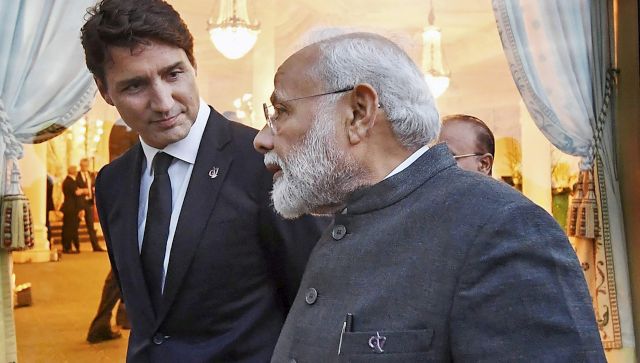Canadian foreign policy is hitched to the idea of middle power identity. Excessive idealism and moral prescriptive behaviour featured in the decisions of Canadian foreign policy in the Cold War era. At least, in theory, middle powers are ardent believers and followers of finding “compromising solutions,” follow “multilateral” means and behave as “good international citizens”. These states are inclined to offer their services to preserve the international order. Most scholars who study middle powers also associate them with maintaining the global system and keeping “balances of power” that foster peace and bring prosperity through institutional memberships and linkages. Recent Canadian diplomatic spats against their Indian counterparts contradict this behaviour and diverge from its incipient role. Not only Canada, by inciting alleged India’s involvement in the killing of a Canadian national, Hardeep Singh Nijjar, deteriorated the bilateral ties. But it also gave New Delhi a moment to realise the West’s behaviour against “non-Western” power. Obligated to follow principles that solidify and reiterate existing power balances, Canada’s recent moves point to a compromise that seeks to rectify domestic electoral imbalance at the expense of a valuable partner. Canadian bouts of allegation and five-eyes Anglo-Saxon collaboration to muster intelligence have unsettled New Delhi. The time is not good enough when China challenges the power balance, and the “guardians” of those balances sever ties with a valuable partner. Cracks in Indo-Pacific partners against China would not manifest with such bickering behaviour. Still, it creates a sense of uncertainty in India about the West’s stance towards Ottawa that might loosen the bolts of evolving partnerships against Beijing in the Indo-Pacific region. And the muted responses from Washington and Canberra do convey their strategic preferences. Silence without picking sides is a subtle signal to both partners to temper down and resolve the inconveniences. As bilateral upswings can trigger international bargaining for partners to build support and gather voices of their respective causes, Australia and Washington avoided taking sides. If the two were to take sides, it would have undermined the allegiance of partners and allies to fight for a more significant cause of “system maintenance” that is roiled by Chinese behaviour in the Indo-Pacific region. More so, Canadians have not acted as a good international citizen. Middle powers have a legacy to favour global equality of status and prestige for all. Historically, Canada and Australia vouched for greater representation of middle powers in the United Nations Security Council on the criteria of “war efforts” and “geographical” allocation. The Netherlands vehemently resisted great power control in the UN. Middle powers, theoretically, assumed the role of mediating and steering compromising solutions. Canada’s peacekeeping operations and contributions of troops to man the Korean faultlines, initiating the United Nations Emergency Forces to dilute the Suez crisis, signals Ottawa’s willingness to shoulder responsibilities of keeping the international system in order. However, recently, Canada has breached the middle power identity to curry domestic political favours by escalating the issue for electoral gains in the upcoming elections. Canada harbouring elements that espouse scalping the Indian territory subverts its good international behaviour. Trudeau’s attendance at Khalsa Day Parade in 2017, the 2018 diplomatic disaster, and reluctance to extradite the mastermind that bombed an Air India flight in 1985 exacerbate the already tense free-fall in relations. While Canada’s diplomatic footwork had offered troubleshooting solutions in the past, such balancing acts have also rendered backlashes—India’s current diplomatic offence results from Ottawa’s brewing disequilibrium to manage domestic interests and international priorities. Significant mends to balance domestic and international concerns could have precluded contemporary distrust in ties. Five Eyes intelligence coalition, a mini-grouping, is used to pinpoint allegations against India. As the norm suggests, sorting out differences bilaterally would have been desirable. The tinge of multilateralism will only complicate the process. Although such groupings possess geopolitical motives, they can also be used to temper down volatile spats and stop abrupt over-reactions through engineering diplomatic solutions. Canada seems to have lost the opportunity, while the Indian side escalated, especially with the demand for the diplomatic withdrawal of 41 Canadians from the embassy in New Delhi due to deeply spiralling relations. The solution to this simmering dispute is reinstating Canadian past responsibilities and its functions. Ottawa’s role and function to bridge difficulties and act in concerts by banding together offered feasible solutions immediately following World War II. Similarly, leaving aside the domestic selfishness and moral prescriptions on “extra-judicial killings”, Canada’s pragmatism lies in eclipsing domestic lures and balancing values to preserve bilateral and multilateral cohesion. Canada’s name-calling of India did highlight an advocacy to reform norms against “extra-judicial killings”. However, not when domestic self-interest is so evident. While it is commendable to advocate standards, Canada’s discrepancies in following the “normal mould” contradict the behaviour of middle powers that zealously guard the status quo. While the issue could have been handled carefully, the escalation from the Canadian side to publicise and accuse Indian intelligence and politicise it to gain credibility is a totally uncalled for diplomatic manoeuvre. The idea of middle power is flexible and highly adaptable. The Canadian government will serve the international system better if they forge alliances and maintain them to balance against China. Norm entrepreneurship can be rolled, but not at the expense of a partner that matters more for sustaining a secured balance in the Indo-Pacific international affairs. The author is a Research Analyst, Asia Society Policy Institute, Delhi. Views expressed in the above piece are personal and solely that of the author. They do not necessarily reflect Firstpost_’s views._ Read all the Latest News , Trending News , Cricket News , Bollywood News , India News and Entertainment News here. Follow us on Facebook, Twitter and Instagram.
It creates a sense of uncertainty in India about the West’s stance towards Ottawa that might loosen the bolts of evolving partnerships against Beijing in the Indo-Pacific region
Advertisement
End of Article


)

)
)
)
)
)
)
)
)



